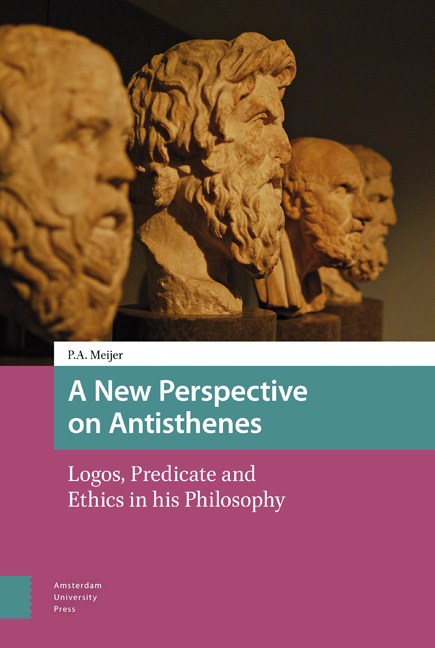Book contents
- Frontmatter
- Dedication
- Contents
- Preface
- Abbreviations
- Primary Sources – Editions Used
- Introduction
- Part I LOGOS AND PREDICATE
- Part II ANTISTHENES’ VIEWS ON THEOLOGY: HIS THEORETICAL APPROACH TO THE STUDY OF HOMER
- Part III ANTISTHENEAN ETHICS
- Epilogue: Antisthenes, an Assessment
- Appendix II The Speeches of Ajax and Odysseus
- Bibliography
- Concordance Giannantoni (SSR) – Caizzi (D.C.)
- Index
Preface
Published online by Cambridge University Press: 24 December 2020
- Frontmatter
- Dedication
- Contents
- Preface
- Abbreviations
- Primary Sources – Editions Used
- Introduction
- Part I LOGOS AND PREDICATE
- Part II ANTISTHENES’ VIEWS ON THEOLOGY: HIS THEORETICAL APPROACH TO THE STUDY OF HOMER
- Part III ANTISTHENEAN ETHICS
- Epilogue: Antisthenes, an Assessment
- Appendix II The Speeches of Ajax and Odysseus
- Bibliography
- Concordance Giannantoni (SSR) – Caizzi (D.C.)
- Index
Summary
For most of his professional life, the author of the present book, P.A. (Piet) Meijer, was university lecturer in Ancient Philosophy in the Classics department of Leiden University where he taught with contagious enthusiasm. His classes were characterized by an attractive sort of irreverence towards academic authority. Any scholar, no matter how great his or her reputation, could be wrong and Meijer would take great pleasure in demonstrating that, in his view, they often were, on the basis of thoughtful and often innovative readings of the primary texts. In much the same spirit he meanwhile produced a steady stream of studies on a variety of subjects, such as Plotinus’ metaphysics (Plotinus on the Good or the One (Enneads VI,9): An Analytical Commentary, Amsterdam 1992), Parmenidean ontology (Parmenides Beyond the Gates: The Divine Revelation on Being, Thinking and the Doxa, Amsterdam 1997) and Stoic theology (Stoic Theology: Proofs for the Existence of the Cosmic God and of the Traditional Gods, Delft 2007), to mention but the most important ones.
Upon his retirement, Meijer continued to do research with an almost youthful zeal. He had discovered Antisthenes, whose wit, intellectual acuity and subversive character had clearly struck a cord with him. As Meijer himself sets out in the introduction to this book, Antisthenes was one of the most important and colourful followers of Socrates. He made a major contribution to the history of ancient philosophy by offering the first definition of logos. Unfortunately, his reputation would soon be eclipsed by that other pupil of Socrates, Plato. As a result, Antisthenes’ many books dropped out of circulation and hence did not survive. For the reconstruction of Antisthenes’ views, then, we depend on reports of others, and those of Aristotle in particular. In the first part of this book, Meijer argues that Aristotle did not do justice to Antisthenes and sets out to offer a new, provocative interpretation of the famous logos doctrine of the latter. He argues that Antisthenes’ famous oikeios logos is not a definition, as Aristotle had claimed, but an argument that teaches or clarifies what something was or is. One attractive aspect of Meijer's new understanding of Antisthenes’ logos concept is that it allows him to connect this important aspect of Antisthenes’ thought to another, that of the study of Homer.
- Type
- Chapter
- Information
- A New Perspective on AntisthenesLogos, Predicate and Ethics in his Philosophy, pp. 11 - 12Publisher: Amsterdam University PressPrint publication year: 2017

